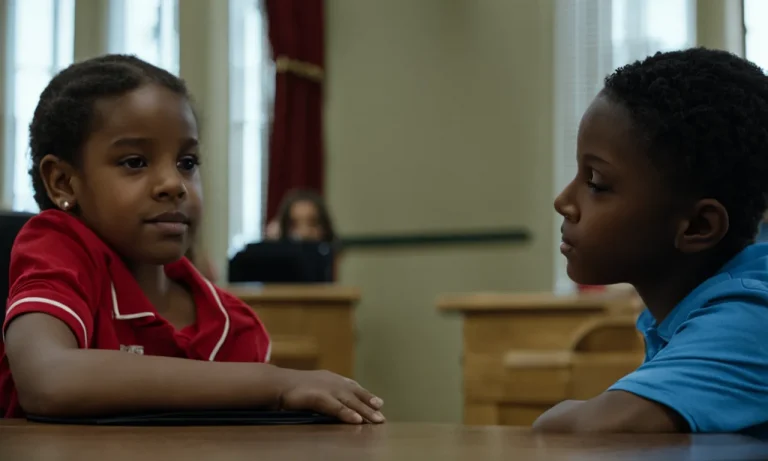Sending kids off to their first day of school is a rite of passage for many families. But what if you decide not to enroll your child in school at all? While homeschooling is a legal alternative to traditional schooling, simply never enrolling your child is illegal in all 50 states.
If you’re short on time, here’s a quick answer to your question: In the United States, it is illegal to not enroll your child in any type of approved schooling. Consequences vary by state but may include truancy charges, educational neglect charges, or even loss of custody.
In this article, we’ll explore what can happen if you don’t enroll your child in school or provide them with an approved homeschool education. We’ll look at what the laws say, penalties you may face, and steps authorities can take if a child is found to be chronically truant.
Compulsory Education Laws
Compulsory education laws play a crucial role in ensuring that children receive a proper education and acquire the necessary skills for their future. These laws require parents to enroll their children in school and ensure their regular attendance.
Let’s take a closer look at the overview of these laws and the exceptions that exist.
View this post on Instagram
Overview of Laws Requiring School Attendance
Compulsory education laws vary from country to country, but they are generally in place to ensure that children receive a minimum level of education. In most countries, these laws require children to attend school from a certain age until they reach a certain grade level.
For example, in the United States, the laws require children to attend school from the ages of 5 to 18.
The purpose of these laws is to promote universal education and provide equal opportunities for all children. By mandating school attendance, governments aim to reduce illiteracy rates and equip children with the knowledge and skills they need to succeed in life.
It is through education that societies can thrive and individuals can reach their full potential.
Exceptions Such as Homeschooling and Private School
While compulsory education laws require children to attend school, there are exceptions that allow for alternative forms of education. One such exception is homeschooling, where parents choose to educate their children at home instead of sending them to a traditional school.
Homeschooling provides parents with the flexibility to tailor the curriculum to their child’s needs and interests. It allows for personalized instruction and individualized attention. However, it is important to note that homeschooling regulations vary from country to country and even within different states or provinces.
Another exception to compulsory education laws is private schooling. Some parents choose to enroll their children in private schools, which often offer specialized programs, smaller class sizes, and a different educational philosophy.
Private schools provide an alternative to public education and allow parents to have more control over their child’s education.
It is essential for parents to be aware of the educational options available to them and to comply with the laws and regulations in their jurisdiction. By doing so, they can ensure that their child receives an education that meets their needs and prepares them for the future.
View this post on Instagram
Consequences for Not Enrolling a Child in School
Educational Neglect Charges
One of the most serious consequences of not enrolling a child in school is the possibility of facing educational neglect charges. Educational neglect refers to the failure of parents or guardians to ensure that their child receives an appropriate education.
Laws regarding educational neglect vary by jurisdiction, but in many places, it is considered a form of child abuse or neglect. Being charged with educational neglect can lead to legal proceedings, the involvement of child protective services, and potential removal of the child from the home.
Truancy Charges and Fines
Another consequence of not enrolling a child in school is the potential for truancy charges and fines. Truancy refers to unexcused absences from school, and it is typically considered a misdemeanor offense.
If a child is not enrolled in school, they cannot attend and therefore may accumulate unexcused absences. In some jurisdictions, parents or guardians can be held responsible for their child’s truancy and may face fines or other legal consequences.
Loss of Custody
In extreme cases, not enrolling a child in school can even lead to the loss of custody. If it can be shown that a parent or guardian is willfully denying their child an education, it can be grounds for the court to remove custody rights.
The court’s primary concern is the well-being and education of the child, and if it is determined that not enrolling the child in school is detrimental to their development, custody may be awarded to another party.
It is important to note that education is a fundamental right for children, and enrolling them in school is not only a legal requirement but also crucial for their overall growth and development. The consequences of not enrolling a child in school are significant and can have long-lasting effects on the child’s future prospects.
Steps Schools and Authorities Take
When a child is not enrolled in school, there are several steps that schools and authorities take to address the situation and ensure the child receives an education.
Following Up On Lack of Enrollment
When a child fails to enroll in school, schools have procedures in place to follow up on the lack of enrollment. This usually involves contacting the child’s parents or guardians to inquire about the reasons for non-enrollment.
Schools may send letters, make phone calls, or even conduct home visits to gather more information and encourage enrollment.
If the parents provide a valid reason for not enrolling the child, such as participating in homeschooling or alternative educational programs, the school may request documentation to ensure the child is receiving an appropriate education.
However, if the parents fail to provide a valid reason or do not respond to the school’s attempts to contact them, the matter is escalated to the next step.
Referral to Child Protective Services
If a child is not enrolled in school and the parents fail to provide a valid reason or do not cooperate with the school’s attempts to address the situation, the school may make a referral to Child Protective Services (CPS) or a similar child welfare agency.
CPS will then conduct an investigation to determine if there are any underlying issues or concerns that may be affecting the child’s education and well-being. This investigation may involve interviews with the child, the parents, and other relevant individuals, as well as a review of any available documentation or evidence.
If the investigation reveals neglect or any other form of harm to the child, CPS may take appropriate actions to ensure the child’s safety and well-being, which may include removing the child from the home or providing support services to the family.
Working with Courts and Truancy Officers
In cases where the child’s non-enrollment continues despite interventions from the school and CPS, the matter may be escalated to the courts. Truancy officers and legal authorities may become involved to address the situation and enforce compulsory education laws.
The courts have the power to issue orders compelling parents to enroll their child in school and may impose penalties or consequences for non-compliance. These penalties can range from fines to community service or even imprisonment, depending on the jurisdiction and severity of the case.
Truancy officers may also be assigned to work closely with the child and their family to address any underlying issues that may be contributing to non-enrollment. They may provide support, resources, and guidance to help the family overcome barriers and ensure the child receives the education they are entitled to.
View this post on Instagram
Providing a Suitable Homeschool Education
Providing a suitable homeschool education is crucial for parents who choose not to enroll their child in traditional school. While the decision to homeschool comes with its own set of challenges, it also offers unique opportunities for personalized and tailored learning experiences.
Requirements That Vary by State
When it comes to homeschooling, the requirements and regulations vary from state to state. Some states have strict guidelines and may require parents to notify the local school district, submit curriculum plans, or even undergo periodic evaluations.
On the other hand, some states have more relaxed regulations, allowing parents more flexibility in designing their child’s education.
Resources for Developing a Curriculum
Developing a comprehensive curriculum is a crucial aspect of homeschooling. Fortunately, there are numerous resources available to assist parents in this process. Online platforms, such as Khan Academy and Coursera, offer a wide range of educational materials and courses that can be incorporated into the homeschool curriculum.
Additionally, public libraries, educational websites, and local homeschooling support groups can provide valuable resources and guidance.
Options for Testing and Demonstrating Progress
One concern that some parents have when homeschooling is how to assess their child’s progress. Fortunately, there are various options available for testing and demonstrating academic achievements. Some states require standardized testing, while others may accept alternative forms of assessment, such as portfolio reviews or evaluations by certified teachers.
Additionally, online platforms and educational organizations offer diagnostic tests and assessments that can be used to track a student’s progress.
Conclusion
If you’re a parent considering not enrolling your child in school, it’s important to understand the legal responsibilities and consequences. Simply keeping your child out of school is not an option in any state.
Homeschooling can be a viable alternative when done properly to meet state guidelines. But skipping out on your child’s education altogether can result in serious charges and loss of custody.
Work within the law to explore alternatives like homeschooling, private school, or transferring to a different public school if your child is struggling. Their education and wellbeing should be the top priority.






